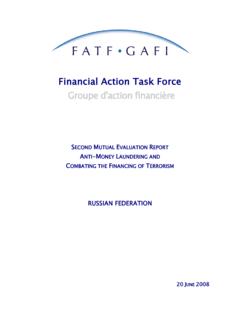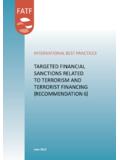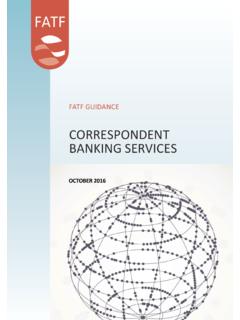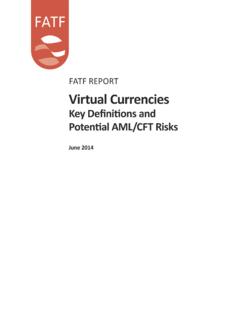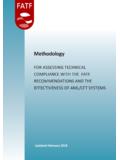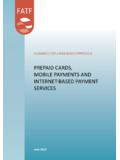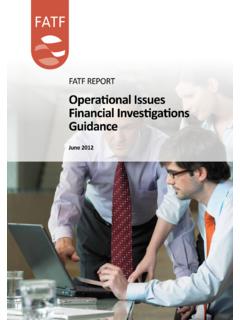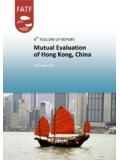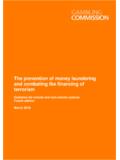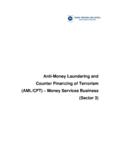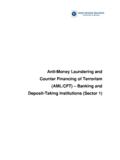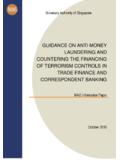Transcription of INTERNATIONAL STANDARDS ON COMBATING …
1 INTERNATIONAL STANDARDS . ON COMBATING money laundering . AND THE financing OF. terrorism & PROLIFERATION. The FATF Recommendations February 2012. INTERNATIONAL STANDARDS . ON COMBATING money laundering . AND THE financing . OF terrorism & PROLIFERATION. THE FATF RECOMMENDATIONS. FEBRUARY 2012. Updated October 2016. THE FATF RECOMMENDATIONS. INTERNATIONAL STANDARDS ON COMBATING money laundering AND THE financing OF terrorism & PROLIFERATION. FINANCIAL ACTION TASK FORCE. The Financial Action Task Force (FATF) is an independent inter-governmental body that develops and promotes policies to protect the global financial system against money laundering , terrorist financing and the financing of proliferation of weapons of mass destruction. The FATF Recommendations are recognised as the global anti- money laundering (AML) and counter-terrorist financing (CFT) standard. For more information about the FATF, please visit the website: This document and/or any map included herein are without prejudice to the status of or sovereignty over any territory, to the delimitation of INTERNATIONAL frontiers and bounderies and to the name of any territory, city or area.
2 Citing reference: FATF (2012), INTERNATIONAL STANDARDS on COMBATING money laundering and the financing of terrorism & Proliferation, updated October 2016, FATF, Paris, France, 2016 FATF/OECD. All rights reserved. No reproduction or translation of this publication may be made without prior written permission. Applications for such permission, for all or part of this publication, should be made to the FATF Secretariat, 2 rue Andr Pascal 75775 Paris Cedex 16, France (fax: +33 1 44 30 61 37 or e-mail: 2 2016. THE FATF RECOMMENDATIONS. INTERNATIONAL STANDARDS ON COMBATING money laundering AND THE financing OF terrorism & PROLIFERATION. CONTENTS. List of the FATF Recommendations 4. Introduction 7. FATF Recommendations 11. Interpretive Notes 31. Note on the legal basis of requirements on financial institutions and DNFBPs 111. Glossary 113. Table of Acronyms 128. Annex I: FATF Guidance Documents 129. Annex II: Information on updates made to the FATF Recommendations 131.)
3 2016 3. THE FATF RECOMMENDATIONS. INTERNATIONAL STANDARDS ON COMBATING money laundering AND THE financing OF terrorism & PROLIFERATION. THE FATF RECOMMENDATIONS. 1. Number Old Number A AML/CFT POLICIES AND COORDINATION. 1 - Assessing risks & applying a risk-based approach *. 2 National cooperation and coordination B money laundering AND CONFISCATION. 3 & money laundering offence *. 4 Confiscation and provisional measures *. C TERRORIST financing AND financing OF PROLIFERATION. 5 SRII Terrorist financing offence *. 6 SRIII Targeted financial sanctions related to terrorism & terrorist financing *. 7 Targeted financial sanctions related to proliferation *. 8 SRVIII Non-profit organisations *. D PREVENTIVE MEASURES. 9 Financial institution secrecy laws Customer due diligence and record keeping 10 Customer due diligence *. 11 Record keeping Additional measures for specific customers and activities 12 Politically exposed persons *. 13 Correspondent banking *.
4 14 SRVI money or value transfer services *. 15 New technologies 16 SRVII Wire transfers *. Reliance, Controls and Financial Groups 17 Reliance on third parties *. 18 & Internal controls and foreign branches and subsidiaries *. 19 Higher-risk countries *. Reporting of suspicious transactions 20 & SRIV Reporting of suspicious transactions *. 21 Tipping-off and confidentiality Designated non-financial Businesses and Professions (DNFBPs). 22 DNFBPs: Customer due diligence *. 23 DNFBPs: Other measures *. 4 2016. THE FATF RECOMMENDATIONS. INTERNATIONAL STANDARDS ON COMBATING money laundering AND THE financing OF terrorism & PROLIFERATION. E TRANSPARENCY AND BENEFICIAL OWNERSHIP. OF LEGAL PERSONS AND ARRANGEMENTS. 24 Transparency and beneficial ownership of legal persons *. 25 Transparency and beneficial ownership of legal arrangements *. F POWERS AND RESPONSIBILITIES OF COMPETENT AUTHORITIES. AND OTHER INSTITUTIONAL MEASURES. Regulation and Supervision 26 Regulation and supervision of financial institutions *.
5 27 Powers of supervisors 28 Regulation and supervision of DNFBPs Operational and Law Enforcement 29 Financial intelligence units *. 30 Responsibilities of law enforcement and investigative authorities *. 31 Powers of law enforcement and investigative authorities 32 SRIX Cash couriers *. General Requirements 33 Statistics 34 Guidance and feedback Sanctions 35 Sanctions G INTERNATIONAL COOPERATION. 36 & SRI INTERNATIONAL instruments 37 & SRV Mutual legal assistance 38 Mutual legal assistance: freezing and confiscation *. 39 Extradition 40 Other forms of INTERNATIONAL cooperation *. 1. The old number' column refers to the corresponding 2003 FATF Recommendation. * Recommendations marked with an asterisk have interpretive notes, which should be read in conjunction with the Recommendation. Version as adopted on 15 February 2012. 2016 5. THE FATF RECOMMENDATIONS. INTERNATIONAL STANDARDS ON COMBATING money laundering AND THE financing OF terrorism & PROLIFERATION.
6 6 2016. THE FATF RECOMMENDATIONS. INTERNATIONAL STANDARDS ON COMBATING money laundering AND THE financing OF terrorism & PROLIFERATION. INTRODUCTION. The Financial Action Task Force (FATF) is an inter-governmental body established in 1989 by the Ministers of its Member jurisdictions. The mandate of the FATF is to set STANDARDS and to promote effective implementation of legal, regulatory and operational measures for COMBATING money laundering , terrorist financing and the financing of proliferation, and other related threats to the integrity of the INTERNATIONAL financial system. In collaboration with other INTERNATIONAL stakeholders, the FATF also works to identify national-level vulnerabilities with the aim of protecting the INTERNATIONAL financial system from misuse. The FATF Recommendations set out a comprehensive and consistent framework of measures which countries should implement in order to combat money laundering and terrorist financing , as well as the financing of proliferation of weapons of mass destruction.
7 Countries have diverse legal, administrative and operational frameworks and different financial systems, and so cannot all take identical measures to counter these threats. The FATF Recommendations, therefore, set an INTERNATIONAL standard, which countries should implement through measures adapted to their particular circumstances. The FATF Recommendations set out the essential measures that countries should have in place to: identify the risks, and develop policies and domestic coordination;. pursue money laundering , terrorist financing and the financing of proliferation;. apply preventive measures for the financial sector and other designated sectors;. establish powers and responsibilities for the competent authorities ( , investigative, law enforcement and supervisory authorities) and other institutional measures;. enhance the transparency and availability of beneficial ownership information of legal persons and arrangements; and facilitate INTERNATIONAL cooperation.
8 The original FATF Forty Recommendations were drawn up in 1990 as an initiative to combat the misuse of financial systems by persons laundering drug money . In 1996 the Recommendations were revised for the first time to reflect evolving money laundering trends and techniques, and to broaden their scope well beyond drug- money laundering . In October 2001 the FATF expanded its mandate to deal with the issue of the funding of terrorist acts and terrorist organisations, and took the important step of creating the Eight (later expanded to Nine) Special Recommendations on Terrorist financing . The FATF Recommendations were revised a second time in 2003, and these, together with the Special Recommendations, have been endorsed by over 180 countries, and are universally recognised as the INTERNATIONAL standard for anti- money laundering and countering the financing of terrorism (AML/CFT). 2016 7. THE FATF RECOMMENDATIONS. INTERNATIONAL STANDARDS ON COMBATING money laundering AND THE financing OF terrorism & PROLIFERATION.
9 Following the conclusion of the third round of mutual evaluations of its members, the FATF has reviewed and updated the FATF Recommendations, in close co-operation with the FATF-Style Regional Bodies (FSRBs) and the observer organisations, including the INTERNATIONAL Monetary Fund, the World Bank and the United Nations. The revisions address new and emerging threats, clarify and strengthen many of the existing obligations, while maintaining the necessary stability and rigour in the Recommendations. The FATF STANDARDS have also been revised to strengthen the requirements for higher risk situations, and to allow countries to take a more focused approach in areas where high risks remain or implementation could be enhanced. Countries should first identify, assess and understand the risks of money laundering and terrorist finance that they face, and then adopt appropriate measures to mitigate the risk. The risk-based approach allows countries, within the framework of the FATF.
10 Requirements, to adopt a more flexible set of measures, in order to target their resources more effectively and apply preventive measures that are commensurate to the nature of risks, in order to focus their efforts in the most effective way. COMBATING terrorist financing is a very significant challenge. An effective AML/CFT system, in general, is important for addressing terrorist financing , and most measures previously focused on terrorist financing are now integrated throughout the Recommendations, therefore obviating the need for the Special Recommendations. However, there are some Recommendations that are unique to terrorist financing , which are set out in Section C of the FATF Recommendations. These are: Recommendation 5 (the criminalisation of terrorist financing ); Recommendation 6 (targeted financial sanctions related to terrorism & terrorist financing ); and Recommendation 8 (measures to prevent the misuse of non-profit organisations).
